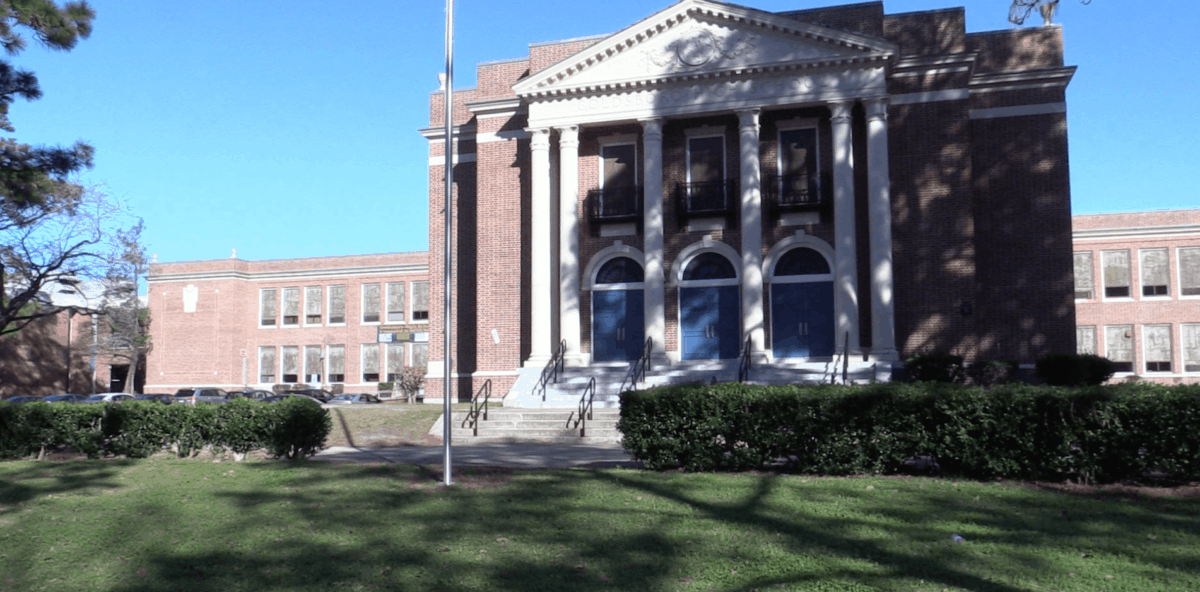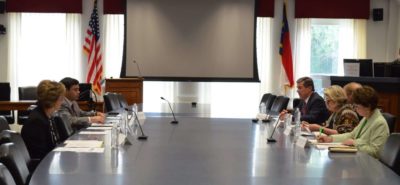Updated: 10:20 p.m.
A bill clarifying reporting requirements on the teaching of cursive writing and multiplication tables passed the Senate unanimously Wednesday after receiving a number of additions. Though it passed the House unanimously last week, the bill has to go back to that chamber for concurrence since additions were made in the Senate.
House Bill 986 seeks to make reports on who is teaching cursive writing and multiplication tables clearer to the state.
Rep. Pat Hurley, R-Randolph, said the legislature required reporting on these subjects years ago, but she says the reports she’s seen only provide percentages of people teaching the subjects and she needs more detail.
“It’s been five years and some of the schools are not teaching it. And I just want to know who’s not and who is,” she said in a Senate education committee Wednesday.
Another measure in the bill requires schools to put students who score a 5 on their end-of-grade or end-of-course tests into advanced math classes the following year.
“We sometimes have a selection process. We tend to decide…that certain kids for economic or other reasons can’t do certain work,” said Rep. Craig Horn, R-Union, adding during the Senate education committee that this bill would fix that problem.
In the Senate education committee, the bill received a number of additional provisions, including:
- Requiring the State Board of Education to provide information from annual performance reports for educator preparation programs
- Requiring the state Department of Public Instruction to develop a mental health training program and suicide risk referral program
- Requiring Superintendent Mark Johnson to study and make recommendations on how to reduce testing that is not required by state or federal laws
- Allowing a district with a high number of restart schools to opt into a renewal school system that would allow the entire district to have more flexibility than traditional public schools
The provision related to performance for educator preparation programs stems from a report earlier in the week from the General Assembly Program Evaluation Division that recommended ways educator preparation programs could better report data.
The provision related to the renewal school district was created to respond to the rise of restart schools in North Carolina. Restart schools are continually low-performing schools that apply to operate under the restart reform model, allowing them to have charter-like flexibility. EducationNC wrote extensively about restart schools in collaboration with WRAL. Sen. Michael Lee, R-New Hanover, said in the Senate education committee that this provision would really only apply to one school district, Rowan-Salisbury, which has so many restart schools that it has become unwieldy.
“You’re essentially running two school systems at the same time,” he said, adding this bill would allow the district to run all its schools as a whole.
The bill specifies it only affects the school district in the state with the highest number of restart schools. Along with that requirement, the district must also have received low-wealth supplemental funding in the 2017-18 school year, and have had more than 10,000 students for the 2017-18 school year. While the schools in the district will have more flexibility than most traditional public schools, there are restrictions on what state statutes the schools in the district will be exempt from.
Superintendent Mark Johnson weighed in publicly on the testing aspects of the bill after it passed the Senate Wednesday night. In a press release from Senate President Pro Tempore Phil Berger, R-Rockingham, Johnson said he is “committed” to reducing the testing burden, noting that he campaigned on this issue.
“Our work has already begun and I applaud the General Assembly for joining with me in this important goal,” he said. “I look forward to giving them my recommendation on how to reduce the testing burden in North Carolina.”
But it was the provision that makes it easier for some students to get into advanced math classes that received the bulk of the attention and bipartisan praise.
Rep. Ed Hanes, D-Forsyth, said in a press release that thousands of capable low-income students have been shut out of advanced math classes.
“By passing this legislation and giving these low-income students the opportunity to post-secondary studies, we are providing them the means to possess the intellectual capital, the social capital and the cultural capital necessary to change their impoverished conditions,” he said.
In the same press release, Rep. Chris Malone, R-Wake, said advanced courses help students who take them in middle school do better in their future studies and career.
“Students can thrive in more rigorous classrooms, and we should be doing all we can to ensure that every child has an opportunity to take these courses,” he said.
Brenda Berg, CEO of BEST NC, wrote in an emailed comment about the importance of this provision in a world where most new jobs require STEM expertise.
“Giving more qualified students access to advanced math will help prepare them for college and career success while improving the overall strength of our workforce,” she said. “I applaud both the House and the Senate for their unanimous support.”
And Matt Ellinwood, director of the Education & Law Project at the NC Justice Center, said the bill “is an important first step in ensuring children who have earned the right to participate in advanced classes have the opportunity to do so,” adding that he would like to see this opportunity extended to other subjects.
Resolving funding disputes
House Bill 1031, which aims to resolve funding disputes between county commissioners and school boards passed the House rules committee Tuesday night and the full House Wednesday night. The bill creates a funding formula for when county commissioners and school boards can’t agree on a budget, eliminating the school boards’ ability to file lawsuits related to funding. A formula related to school construction money was removed from the bill Tuesday night. In its place, the bill allows courts to settle conflicts if mediation doesn’t work.
Income tax cap
House finance committee members moved a bill forward Wednesday that would let voters decide on an income tax cap.
The State Constitution currently gives legislators the ability to raise the income tax rate up to 10 percent. In 2019, tax cuts are set to drop the current rate from 5.49 to 5.25 percent. This constitutional amendment would limit the maximum income tax rate to 5.5 percent.
Rep. Graig Meyer, D-Orange, voted against the measure in committee. He said he was concerned that, during emergency situations, the state would resort to sources of tax revenue that disproportionately hurt the working class.
“If this constitutional amendment was enacted by the voters, the practical impact is that when the state or counties need additional resources, in times of crisis, and our ability to raise the income tax is limited, the taxes that will get raised will be property taxes, sales taxes, and user fees,” Meyer said. “Those are the taxes that have the greatest impact on everyday working North Carolinians. Your ability to address crisis through raising income taxes has the upside of being able to get people who are the most able to protect themselves from crisis to help shoulder the burden.”
Republican legislators backing the measure feel there are other ways to save money in case of a financial or natural crisis. Sen. Tommy Tucker, R-Union, said Republican tax policy helped the state leave hard financial times and raise education spending.
“We moved from the paltry $7 billion dollars for K-12 that was spent in the 2009-10 budget to $9.5 billion dollars for K-12, and education still takes up 58 percent of our budget,” Tucker said. “So sir, I think history has taught us, and facts do matter, that the previous tax policy of raising income tax would not be beneficial because of the downturn that would come in the next recession.”
The bill will be heard next by the House rules committee.
Budget technical corrections
A budget technical corrections bill passed the Senate Wednesday and will likely be heard in the House this week. It includes a few education related provisions, including the removal of $200,000 for school supplies only for certain Charlotte schools. The nonprofit that would have received and handled the money, Donors Choose, refused it and the provision was criticized by Democrats and others as “pork.”
Another provision prevents the state Department of Public Instruction from taking money from the Office of Charter Schools to meet mandated budget cuts to the organization.




